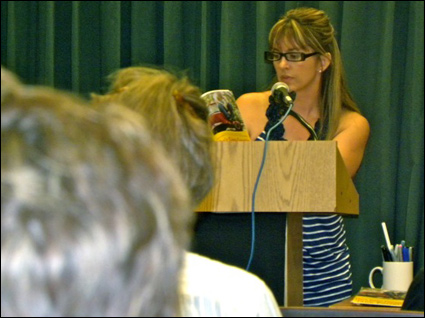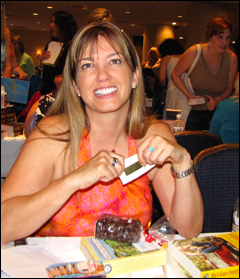Workshop Descriptions
Jane regularly speaks at writers groups worldwide. Read on to view a list of workshops Jane loves to share. Click on any workshop title to be whisked away to a detailed description. Bring Jane to speak at your writer’s group meeting or conference. Contact Jane for availablity.
- Writing Bestselling Fiction: Using Emotion to Power Up the Story
- The Personal Platform: Tapping Your Life Experience for Great Fiction
- Writing in 1st Person Workshop
- Intense & Tight: Pacing the Short Contemporary
- Love, Sex, and the Alpha Male
- Playing Nice with Your Dragon
- Creating the Unforgettable Heroine
- Writing Tight Dialogue
- Voice & Market Workshop: Writing Smart, Writing Well, Writing to Sell
- Ten Keys to Success & Survival: What Every Romance Author Should Know
- Writing Hot: It's Not Just Great Sex
Writing Bestselling Fiction: Using Emotion to Power Up the Story
Many modern-day readers—particularly romance and women's fiction readers—expect to live the story through the mind of the character, and end up experiencing the story as if the reader is the character. Therefore our job as writers is to make the experience as real as possible. We must infuse our characters with depth and emotional integrity. This workshop will take a look at the six tools for writing emotion and some of my favorite tips and techniques for powering up the story.
The Personal Platform: Tapping Your Life Experience for Great Fiction
All writers draw on their imagination, histories and inner themes. Some writers comfortably mine their lives, others reject drawing on personal experience for their work. But all writers have themes, and these themes come from our psyche, our dreams, our frustrated wants and needs. The secret to using your life or your 'platform' to create great fiction is to look for the universal in the personal and then build on the elements your readers can relate to.
Writing in 1st Person Workshop
Jane Porter will take a close look at the industry trend of writing in first person and discuss the pluses and minuses of writing in 1st person instead of 3rd. The workshop will also examine dialogue, themes, and dramatic importance in today's bestselling chick-lit and women's fiction novels. If you've ever wanted to explore voice and narrative in today's market, this workshop is for you.
Intense & Tight: Pacing the Short Contemporary
The short contemporary novel isn't a shorter version of the long contemporary novel. It's a totally different beast altogether. Readers that love short contemp series, love it because it's a roller coaster read-fast, intense, tight. The magic of the short contemporary is the pacing.
The short contemporary thrives on tension, and our job as writers is to deliver this tension. We want to hook readers on page one and keep them hooked. The goal is to get them reading breathlessly, to have them turning pages without putting the book down.
For readers to read with this breathless anticipation, we've got to learn to intensify the short contemporary's story time. There's no room to waste in these books, no place for extra words, or slow, meandering scenes. If we can think of our books as mini-mainstreams then we'll be able to deliver the flavor, texture, conflict, motivation of a longer book by just narrowing the scope of the plot.
To establish an intense and satisfying pace, writers need to watch out for potential dangers and irritants, as well as learn craft techniques that will increase story momentum without losing energy.
Love, Sex, and the Alpha Male
The Alpha Male as Top Dog (Definition of an Alpha Male)
An Alpha Male Doesn't Run from a Fight (character and motivation)
The Alpha Male's Emotional Appeal (why readers love him)
The Alpha Male is a Sophisticated Lover (how to write love scenes with sizzle & tension)
Why the Alpha Male needs a Mission (the hero is transformed by love)
An Alpha Male needs an Alpha Female (write the right heroine for your hero)
Playing Nice with Your Dragon
This workshop examines the writer's life, using dragon symbolism to demonstrate how we commercial writers must remain devoted to craft and the art of fiction, while refusing to allow our muse to run the show unchecked, showing up at will, deserting at will, and generally creating havoc.
A dragon run amuck is not a good thing. A dragon out of control eats villagers, creates terror, spits fire — this dragon is not helping anybody and would generally be hunted down by the hardier castle knights and warriors and put to death. Not a good end to a beautiful, mythical beast.
How to keep a dragon happy?
1) The dragon wants pretty much primary importance in your life.
2) Your dragon wants to be told he or she's beautiful.
3) Dragons like regular cycles of activity and rest (i.e. your dragon has to be allowed to sleep-a lot. In fact, a sleeping dragon is a sign of a healthy life.)
We dragon keepers (not slayers!) walk a fine line: we must allow the dragon healthy independence without letting the dragon control the future.
How to do this? Define Your Expectations, Be Prepared for Pit-falls, and Problem Solve, including developing a psychology of power. Most of us weren't raised to think of ourselves as warriors, or dragon keepers, and yet the creative life demands we assert ourselves and take responsibility for what we think and what we hope to achieve.
Creating the Unforgettable Heroine
Creating the Unforgettable Heroine, the companion workshop to New York's Love, Life, Sex and the Alpha Hero Workshop, analyzes the traits of the unforgettable heroine, as well as the challenges of getting the complex heroine right on paper. Unlike the larger than life hero, the heroine must be emotionally accessible from the start of the book-firmly grounded in reality-and yet someone the reader can cheer for.
Meeting Reader Expectations
Because the majority of our readers are women, our readers have different expectations for the heroine
than the hero. Our heroines can't be as flawed as the heroes, and yet our heroines must still grip the
reader's imagination. Our readers want strong heroines, real women that are compelling, powerfully
motivated, and ultimately heroic.
Where do we find the traits of this compelling heroine?
While our hero stems from our imagination, the heroine must come from our hearts and lives. The traits
of the unforgettable heroine are found within each of us — she's the woman we'd want as our best friend,
the woman we ourselves would like to be.
How do we create such a heroine — not just once, but in book after book?
Using video clips from six popular films, Jane discusses the unique challenges women face from a
historical and modern perspective, addressing issues like sexism, feminism, cultural limitations and
prejudice, and the complexity of being strong without alienating other women and men.
The challenges facing the heroine are daunting, but unforgettable heroine is able to meet these challenges with courage, humor and passion, winning not just our reader's respect, but ensuring an unforgettable ending.
Writing Tight Dialogue
Dialogue makes up the biggest chunk of your novel. Dialogue gets readers turning pages. And dialogue is what helps your readers fall in love with your characters.
So how do you write tight dialogue? It's a two step process. You write.
And then you edit. And the editing, quite frankly, never ends. I'm usually
line editing my dialogue until my editor won't let me touch the
manuscript — or print out — one more time.
Dialogue basics: dialogue goes hand and hand with pacing. Through dialogue you can convey essential details in an interesting and efficient way.
Used correctly, dialogue:
A. Progresses the Plot
B. Reveals Character
C. Shows (Emotional) Context
D. Entertains
In the workshop Jane discusses linguistics, the differences between male/female communication styles, and shares 10 craft techniques for using dialogue to make your characters and conflict come alive.
Voice & Market Workshop: Writing Smart, Writing Well, Writing to Sell
Your writing voice is you on paper. It's the basic storyteller in each of us putting an idea together. You can embellish a voice, strip a voice, but in the end, the voice is what it is. To write smart, and write well, you have to know who you are to develop your strengths and use your personal style and themes to sell.
It's vital to establish the you before you target your audience. Know your strengths, preferences, even weaknesses as a writer. Know what sets you apart and yet what also ties you to other writers. This knowledge has to be more than genre-specific. Don't merely accept that you are a historical writer, a mystery writer, or a category writer.
In this workshop Jane uses fairy tales, Greek myths, and market knowledge to teach others how to succeed in the romance industry. The workshop focuses on Voice & Style, Voice & Theme, and Voice & Market and helps participants identify their own strengths and personal themes, along with possible markets for submission.
Ten Keys to Success & Survival: What Every Romance Author Should Know
This workshop examines the ten things Jane knows now but wishes she knew earlier about our industry. Obviously every writer's experiences are unique, but we all should know the basics, and this is Jane's list of basics every writer will want to know. The workshop covers: craft know how, mental strength, personal & professional relationships, publishing hurdles, reviews, and more
The ten key to success and survival are:
1. Secret to Selling
2. The Secret to Survival
3. Goal Setting
4. Perseverance/Mental Strength
5. Market Knowledge & Submission Acumen
6. Get Feedback
7. Rules of Rejection/Revision
8. Be Smart About Relationships
9. Reviews
10. Marketing & Publicity
Writing Hot: It's Not Just Great Sex
Oscar Wilde once wrote, "The essence of romance is uncertainty." It's a clever observation. We walk a fine line when we woo — come on too ardent, and the undecided suitor might flee. And certainly in every male/female meet there's a combination of self-consciousness, uncertainty — and mutual attraction. And it's our jobs as writers, storytellers, to exploit those very human traits. In the early stages of a romance, these three traits drive every step of the new relationship.
The workshop will look at relationship studies, including studies that emphasize the link between happiness and sex, passion and reason, and the chemistry of desire and attraction.
The workshop then applies the results of these studies to our literary craft, focusing on how characterization, plot, motivation and conflict determine the level of sensuality, sexuality and intimacy in every romance, and how every romance novel is different. We can't just write great sex scenes. We have to write a great book. Jane will share tips and techniques for making a story sizzle — emotionally as well as sexually.




